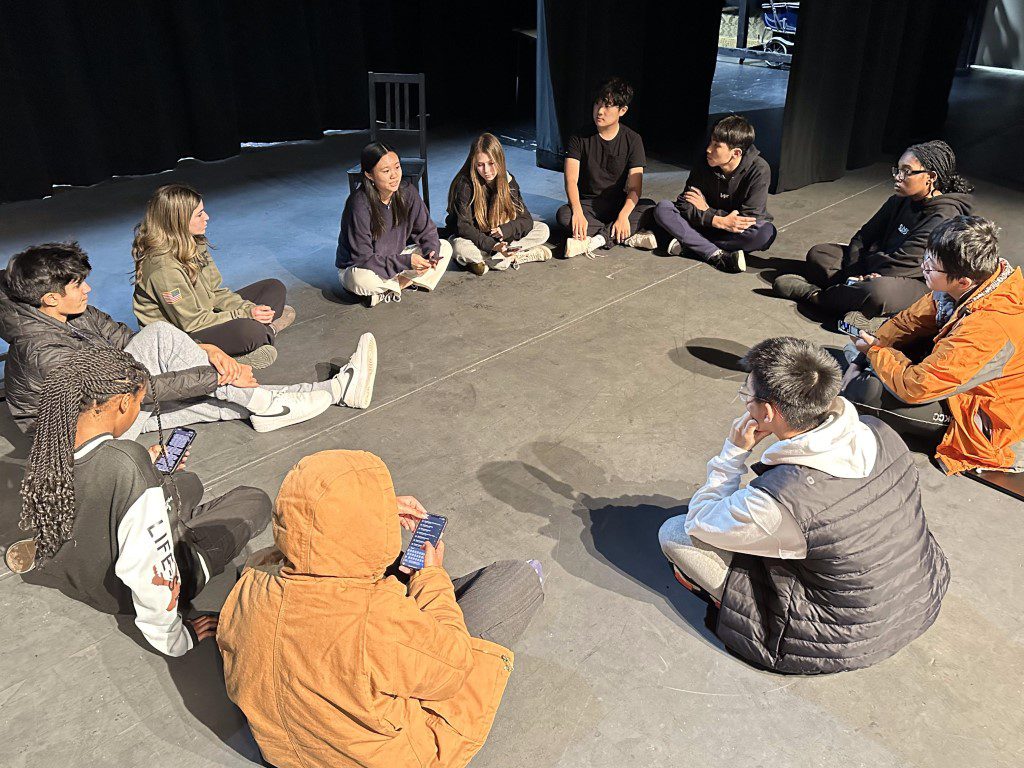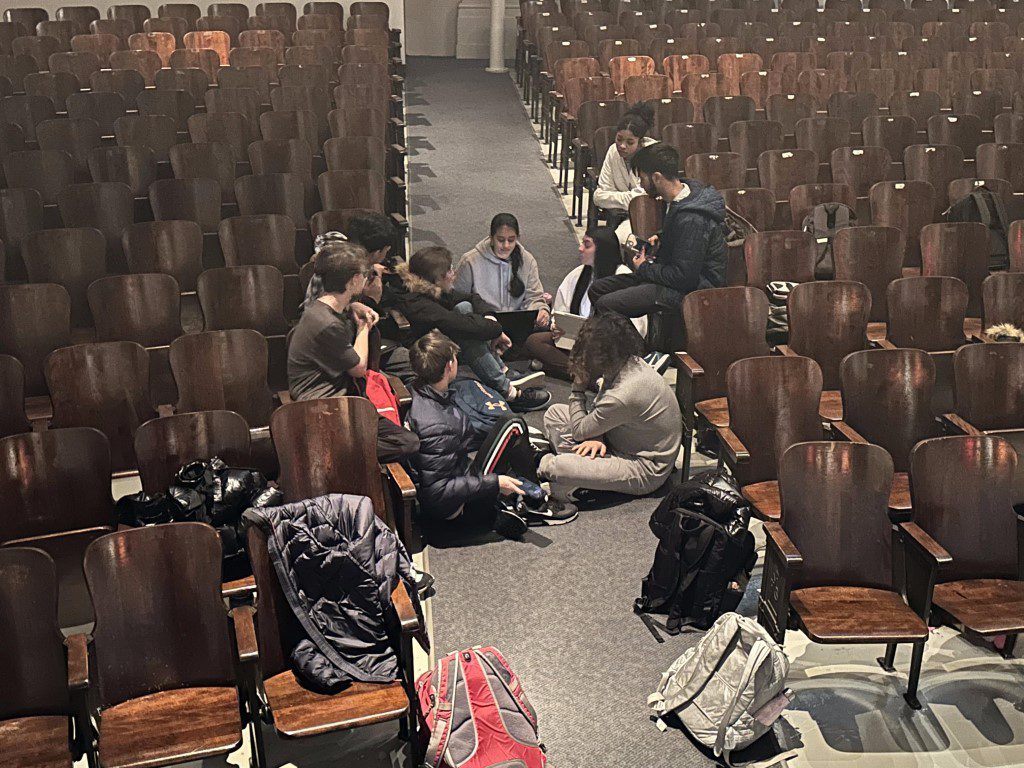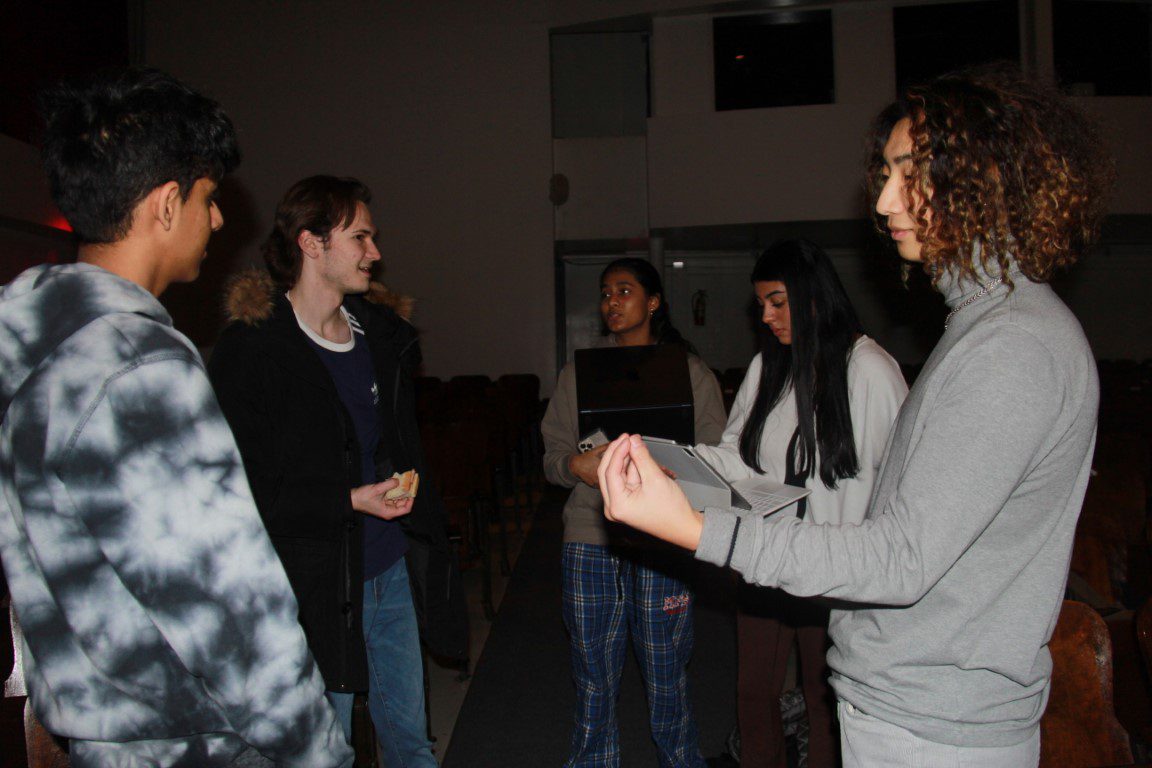Student Perspective: A Behind-the-Scenes Look at Model UN Conference Preparation
Photos: Students prepare for ILMUNC in the MFS Auditorium on January 24.
Marketing and Communications Student Intern Dinah Megibow-Taylor ’24 was part of the delegation of 32 students to attend the Ivy League Model United Nations Conference at the University of Pennsylvania from January 25-28. She provides an “behind-the-scenes look” at preparation for a Model UN Conference below.
Are there any points or motions on the floor?
Placards shoot into the air as committee members eagerly hope to speak in the first session of debate. This question opened each committee at the Ivy League Model United Nations Conference (ILMUNC) hosted by the University of Pennsylvania, ushering in a weekend of impassioned networking, intense debate, and thorough resolution writing. To reach this point was no easy feat for students in the Moorestown Friends delegation; weeks of in-class and independent preparation equipped students with the tools to tackle one of the most competitive Model UN conferences in North America.
Model UN is just what it sounds like: a simulation of the United Nations in which students hone the skills of diplomacy and negotiation through debate. One of the most robust extracurricular offerings at MFS, Model UN can be taken as a semester-long minor course run by a leadership team of seven students, or, for novice students and those looking to casually grow their skill set, Model UN sponsors a club that meets once a week on Fridays. Students enrolled in the class or participating in the club are invited to attend a number of overnight and local single-day conferences over the course of the year. Created as a senior Capstone project by Anna Goula ’18, MFS hosts the Quaker Model United Nations Conference (QMUNC) annually in December, giving students a chance to experience Model UN not only as a participant but as a leader. Traditionally, MFS attends three overnight conferences: Rutgers University Model United Nations (RUMUN), ILMUNC, and a third conference that varies each year.
To prepare for ILMUNC in particular can be described as an energized rush. Coming off the heels of both RUMUN in November and Winter Break, students (called delegates at a Model UN conference) make the most of their time in January to prepare. Class periods are spent in a number of ways; the leadership team runs activities targeted towards improving a certain skill such as speech writing, networking, or more particular aspects of navigating the conference such as negotiating a merger (groups often merge at conferences), or they give time for delegates to research their assigned country or character and offer themselves as resources if delegates are struggling.
If one were to step into the auditorium during a Model UN period, they would most likely be greeted with abounding energy. Perhaps they would see students in pairs on stage speaking about why Chipotle is the best fast food chain. Or maybe, they would see students fielding questions from the audience about a potential solution to reducing food waste, diligently laying out a short- and long-term plan. Each activity, regardless of gravity, creates a culture that is both fun and serious, preparing delegates for a weekend that will be the same.
As students stepped onto the bus last Thursday, and as they stepped into their committees that evening, the all-too familiar feeling of eager anticipation befell them, knowing that their past month’s work would finally propel them into rigorous debate – me included. I, unlike many Model UN students, did not get my start as an underclassman. In fact, I was intimidated by Model UN, thinking that I could never network, write convincing speeches, or exude the confidence that it takes to participate in a conference. It was not until the Fall of my junior year that program leader and close friend Haila Desai ’24 encouraged me to take the risk and throw myself into a conference—and I couldn’t be happier that I did. Model UN is a catalyst of the best parts of MFS extracurriculars. It fosters an extreme sense of community while teaching students the invaluable skills of critical thinking, public speaking, confidence, diplomacy, and negotiation.
More:



